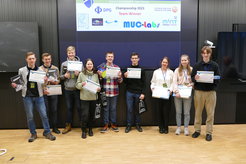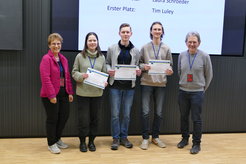GYPT @ MPQ
At the regional competition of the German Young Physicists' Tournament (GYPT) at MPQ, half of the participants make it to the next round.
On 28 January 2023, the MPQ opened its doors to the regional competition of the German Young Physicists’ Tournament (GYPT). The participants gave short presentations explaining different physics problems that they had selected in advance and investigated theoretically and experimentally over several weeks. Six of the twelve participants qualified for the next stage, the national competition in Bad Honnef at the beginning of March.

Nine o'clock in the morning, one Saturday at the end of January. Twelve young physics enthusiasts have gathered at the MPQ to compete in the regional competition of the GYPT - the German Young Physicists' Tournament. For Dr Silke Stähler-Schöpf, jury member and director of the PhotonLab, the GYPT competition is an annual highlight: "There is always a great spirit. The students are excited when they present their problems, so there is such a feeling of anticipation in the air the whole day. And it's nice to experience the exchange between the students and the jury members - many of whom are PhD students at MPQ."

Whoever wants to win the GYPT, has quite a few challenges to face: she or he must be able to work in a team, ask critical questions and participate in discussions - and all of that in English! To be precise, the participants give short lectures in which they present the results of one physical problem. The respective candidate was free to choose the problem from a list of 17 physical phenomena published in the summer and to prepare it by working together in a team. The presenters also have to face questions from the opposing teams and the jury, which then evaluates the presentation according to set criteria.
Half of the twelve candidates in the regional competition at the MPQ made it to the next round, the national competition in Bad Honnef. Tim Luley took first place with his presentation on the mechanical oscillator. He now wants to simulate it with La Grange equations.













